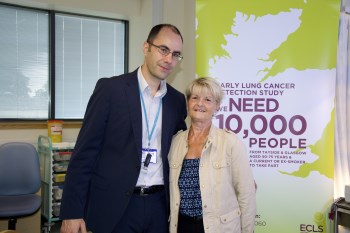Study unmasks Scotland’s silent killer - On the road to detecting lung cancer early
Published On Mon 22 Sep 2014 by Roddy Isles

When Shirley Dolan volunteered a vial of blood for a study at the University of Dundee’s Clinical Research Centre, she had no idea that her lung was harbouring a tumour – which if left undetected for much longer would radically reduce her chance of survival from any treatment.
“I received a letter from my GP inviting me to join a cancer research programme,” said Mrs Dolan. “It is targeting smokers and ex-smokers between the ages of 50-75. Basically, you give a blood sample and it’s checked against a newly developed test for lung cancer.
“I never even had a cough. Without the test, we would never have known, and with lung cancer, by the time people feel symptoms, it is usually too late.”
In Mrs Dolan’s case, her imaging revealed the presence of a tumour that was detected at an early stage allowing surgical removal.
She was diagnosed with lung cancer in May this year and received surgery in July. She hopes to be back at work by October and will receive follow-up monitoring over the next four to five years.
“It was because I joined this study and submitted the blood test that we found my cancer at an early stage,” said Shirley. “I hope my story encourages others to join this programme. I would like to thank everyone involved in my treatment and care at both Ninewells Hospital and Edinburgh Royal Infirmary.”
The research study Shirley joined is the Early Lung Cancer Detection Study (ECLS), which is recruiting a total of 10,000 participants in Scotland from Tayside and Greater Glasgow and Clyde. It is the world’s largest clinical research study looking into detecting early lung cancer using a blood test. Funding is provided by the Scottish Government and Oncimmune, the company that developed the new blood test.
The University of Dundee’s Dr Stuart Schembri is the co-chief investigator of the ECLS, which is a collaboration by researchers from the Universities of Dundee, Glasgow and Nottingham, the Tayside Clinical Trials Unit and NHS Scotland.
“Lung cancer kills more people than any other cancer, with 5,000 people in Scotland dying from the disease every year,” explained Dr Schembri. “There are often few symptoms until the cancer has been growing for a long time and perhaps spread. So of every 10 people found to have lung cancer, nine are unfortunately inoperable.”
The ECLS Study uses a new blood test called EarlyCDT-Lung which, it is hoped, will pick up lung cancer at a stage when it can be treated promptly and hopefully cured.
“Participants may be approached via their GP practices or can contact us directly,“ said Dr Schembri. “The blood is taken locally, either in Dundee or Glasgow or at a GP practice, and the tests are processed in the United States where we look for the presence of certain proteins that the body produces in response to tumours.
“We anticipate 400 to 500 participants in this study will have a positive test result and would be offered a chest X-ray and a series of CT scans over the next two years as we monitor their health and intervene if necessary.”
Not everyone with a positive test will have, or go on to develop, lung cancer.
ECLS is a randomized study so it has a test and a no-test control group which means half of all blood samples will not be tested. By following up the health data of participants over the next 10 years, researchers will be able to measure if the blood test is reliable at detecting early cancer and if this actually saves lives. A decision could then be made on establishing a nationwide lung cancer screening programme, similar to bowel cancer screening which is also led by the University of Dundee.
ECLS is continuing to recruit participants in the Tayside and Glasgow areas until January 2015. If people would like to take part they should contact the study team.
For more details, please contact:
Tayside: 01382 383060
Glasgow: 0141 232 9525
Roddy Isles
Head of Press
TEL: 01382 384910
MOBILE: 07800 581902
E-MAIL: r.isles@dundee.ac.uk